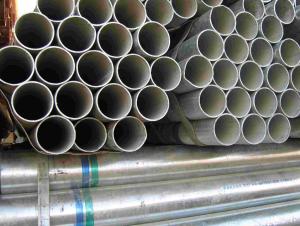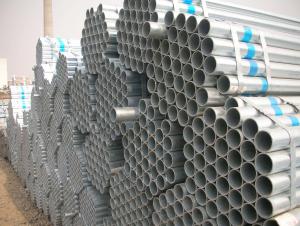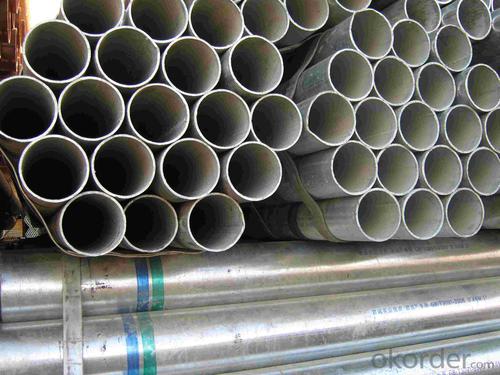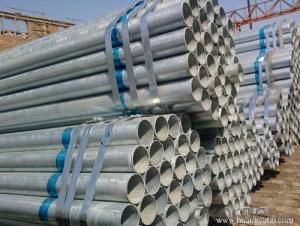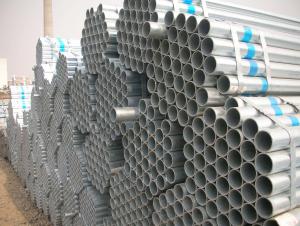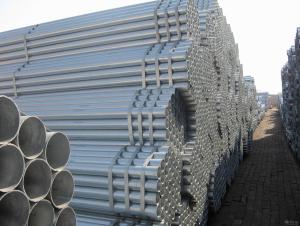America Standard A53 100g Hot Dipped or Pre-galvanized Pipe
- Loading Port:
- Tianjin
- Payment Terms:
- TT or LC
- Min Order Qty:
- 45 m.t.
- Supply Capability:
- 7000 m.t./month
OKorder Service Pledge
OKorder Financial Service
You Might Also Like
1、Structure of Pre-galvanized Galvanized Pipe America Standard A53 100g Hot Dipped or Pre-galvanized Pipe:
The surface of Hot Dipped or Pre-galvanized Galvanized Pipe America Standard A53 100g Hot Dipped or Pre-galvanized Pipecan increase the corrosion resistance of the steel tube, prolong service life. Galvanized pipe is widely used, in addition to water, gas, oil and other general low pressure fluid pipelines. It is also used in the petroleum industry, especially for offshore oil field of oil well pipe and oil pipe, chemical, coking equipment of oil heater, condensation cooler, coal run oil exchanger tube, and trestle pile, the mine tunnel support frame tube.
2、Main Features of Hot Dipped or Pre-galvanized Galvanized Pipe America Standard A53 100g Hot Dipped or Pre-galvanized Pipe:
• High manufacturing accuracy with standard
• High strength and stable
• Good visual effect
• Reasonable price
• Small inertia resistance
• Strong heat dissipation ability
3、Hot Dipped or Pre-galvanized Galvanized Pipe America Standard A53 100g Hot Dipped or Pre-galvanized Pipe Specification:
Standard | GB, DIN, ASTM ASTM A106-2006, ASTM A53-2007 |
Grade | 10#-45#, 16Mn 10#, 20#, 45#, 16Mn |
Thickness | 1 - 33 mm |
Section Shape | Round |
Outer Diameter | 21 - 610mm |
Place of Origin | Tianjin, China (Mainland) |
Secondary Or Not | Non-secondary |
Application | Hydraulic Pipe |
Technique | Cold Drawn |
Certification | API |
Surface Treatment | factory state or painted black |
Special Pipe | API Pipe |
Alloy Or Not | Non-alloy |
Length | 5-12M |
Outer Diameter | 21.3-610mm |
Grade | 20#, 45#, Q345, API J55, API K55, API L80, API N80, API P110, A53B |
Standard | ASME, ASTM |
1) Material:20#(ASTM A 106/A53 GRB.API5LGRB,GB),45#,16Mn,10#.
2) Specification range:OD:21.3-610mm,WT:6-70mm,length:6-12m or according to the requirement of clients.
3) Excutive standards:GB,ASME API5L.ASTM A 106/A53,Despite of the above standards,we can also supply seamless steel pipe with standard of DIN,JIS,and so on,and also develop new products according to the requirements of our clients!
4) Surface:black lacquered,varnish coating or galvanized.
5) Ends:Beveled or square cut,plastic capped,painted.
6) Packing:bundles wrapped with strong steel strip,seaworthy packing.
4、Packaging & Delivery
Packaging Details: | seaworthy package,bundles wrapped with strong steel strip |
Delivery Detail: | 15-30days after received 30%TT |
5、FAQ of Hot Dipped Galvanized Pipe America Standard A53 100g Hot Dipped or Pre-galvanized Pipe:
②How about price?
Yes, we are factory and be able to give you lowest price below market one, and we have a policy that “ for saving time and absolutely honest business attitude, we quote as lowest as possible for any customer, and discount can be given according to quantity”,if you like bargain and factory price is not low enough as you think, just don’t waste your time.Please trust the quotation we would give you, it is professional one.
③Why should you chose us?
Chose happens because of quality, then price, We can give you both.Additionally, we can also offer professional products inquiry, products knowledge train(for agents), smooth goods delivery, exellent customer solution proposals.Our service formula: good quality+good price+good service=customer’s trust
SGS test is available, customer inspection before shipping is welcome, third party inspection is no problem.
6、 Hot Dipped or Pre-galvanized Galvanized Pipe America Standard A53 100g Hot Dipped or Pre-galvanized Pipe: Images:
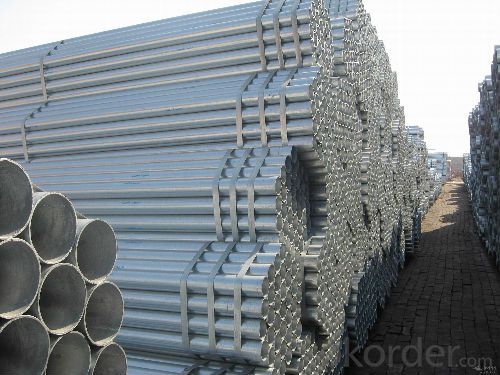
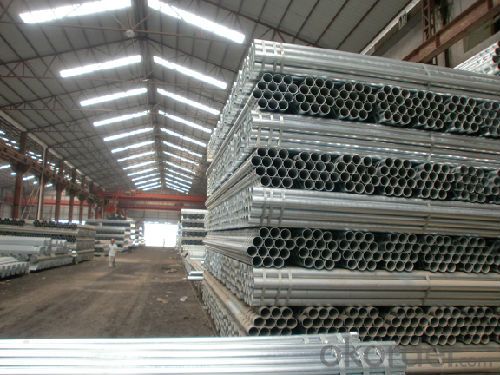
- Q: Can steel pipes be used in plumbing systems?
- Yes, steel pipes can be used in plumbing systems. Steel pipes are commonly used for plumbing installations due to their durability, strength, and resistance to corrosion. They are often preferred for larger water supply lines and can handle high pressure and temperature conditions. However, steel pipes require proper insulation to prevent heat loss and are typically more expensive than alternative materials like PVC or copper pipes.
- Q: DN80 seamless steel tube, what is the standard thickness?
- Commonly used DN80 seamless steel pipe caliber should be 89mm*4mm.
- Q: Can steel pipes be used for geothermal energy systems?
- Yes, steel pipes can be used for geothermal energy systems. Steel pipes are commonly used in geothermal energy systems due to their strength, durability, and resistance to high temperatures and corrosion. They are able to withstand the harsh underground conditions and are suitable for transporting the geothermal fluid from the heat source to the surface for energy extraction.
- Q: How are steel pipes installed underground?
- Steel pipes are installed underground through a process called trenchless installation or open trench excavation. In trenchless installation, a drilling machine creates a tunnel underground, and the steel pipes are then inserted into the tunnel using a technique called pipe jacking or horizontal directional drilling. In open trench excavation, a trench is dug, and the steel pipes are laid in the trench before being covered with backfill material.
- Q: How are steel pipes used in the construction of geothermal power plants?
- Steel pipes are used in the construction of geothermal power plants for various purposes. They are primarily used to transport and circulate the geothermal fluid, which carries the heat from the underground reservoir to the surface. These pipes are typically made of high-quality steel that can withstand the high temperatures and corrosive nature of the geothermal fluid. Additionally, steel pipes are used in the construction of injection wells, where cool water or other fluids are injected back into the reservoir to maintain pressure and sustain the heat extraction process. Overall, steel pipes play a crucial role in the efficient and reliable operation of geothermal power plants.
- Q: Can steel pipes be used for the construction of offshore wind farms?
- Yes, steel pipes can be used for the construction of offshore wind farms. Steel pipes are commonly used for the fabrication of foundation structures, such as monopiles or jackets, which provide stability and support for wind turbine installations in the seabed. The durability, strength, and resistance to corrosion of steel make it an ideal material for withstanding the harsh offshore conditions. Additionally, steel pipes can be easily transported, assembled, and installed, making them a cost-effective and reliable choice for offshore wind farm construction.
- Q: How are steel pipes tested for quality assurance?
- Steel pipes are tested for quality assurance through various methods including visual inspection, non-destructive testing (such as ultrasonic testing and magnetic particle inspection), mechanical testing (such as tensile strength and hardness testing), and dimensional checks. These tests help ensure that the pipes meet the required specifications, standards, and safety regulations, ensuring their durability, reliability, and performance in various applications.
- Q: What are the standard specifications for steel pipes?
- The standard specifications for steel pipes vary depending on the specific application and industry requirements. However, some common standard specifications for steel pipes include dimensions, material composition, strength, and testing procedures. These standards are set by organizations such as the American Society for Testing and Materials (ASTM), the International Organization for Standardization (ISO), and other national or international bodies. It is important to consult the appropriate standard specifications for specific project needs.
- Q: Are steel pipes suitable for use in pharmaceutical industries?
- Yes, steel pipes are suitable for use in pharmaceutical industries. Steel pipes are known for their durability, strength, and resistance to corrosion, making them ideal for transporting various pharmaceutical materials and fluids safely and hygienically. Additionally, steel pipes can withstand high pressure and temperature conditions, ensuring the integrity and efficiency of pharmaceutical manufacturing processes.
- Q: Can steel pipes handle extreme weather conditions?
- Yes, steel pipes are known for their ability to handle extreme weather conditions. Steel is a durable and strong material that can withstand harsh environmental elements, including extreme temperatures, high winds, heavy rainfall, and even extreme weather events like hurricanes and tornadoes. Steel pipes are commonly used in various industries and applications, such as water and sewage systems, oil and gas pipelines, and construction projects, precisely because of their resilience and ability to withstand extreme weather conditions. Additionally, steel pipes can be coated or treated to enhance their resistance to corrosion, further increasing their ability to handle extreme weather conditions.
Send your message to us
America Standard A53 100g Hot Dipped or Pre-galvanized Pipe
- Loading Port:
- Tianjin
- Payment Terms:
- TT or LC
- Min Order Qty:
- 45 m.t.
- Supply Capability:
- 7000 m.t./month
OKorder Service Pledge
OKorder Financial Service
Similar products
Hot products
Hot Searches
Related keywords
